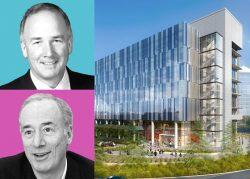Life science real estate has reached new heights in the wake of the pandemic, and a new report shows the sector is showing no signs of slowing down.
Demand for U.S. lab space reached a record high while vacancy fell to 4.9 percent, according to a report from CBRE. That figure sets the sector above and away from the U.S. office market, which stands at a 17 percent vacancy rate.
The Boston-Cambridge market continues to pace the market, accounting for more than 42.1 million square feet of inventory in the sector. The San Francisco Bay Area finished a distant second with nearly 32.7 million square feet of inventory.
In the last six months, demand for space has increased by 19.7 percent and more than 23.7 million square feet of lab, research and development space is under construction.
Outside of having the highest inventory of life sciences space, Boston-Cambridge led the way in several other categories in CBRE’s third quarter report. The market had 134 tenants seeking space and more than 10 million square feet under construction. The 1.1 percent vacancy rate matched New York City for the lowest among major markets.
New York’s $89.92 triple-net lease average asking rent ranked second in the nation, only behind Boston-Cambridge. There was a 39.4 percent increase in demand in the past six months, the third-highest among major markets. The market’s year-to-date leasing activity has exceeded its highest annual total on record.
Read more


Chicago was the only one of the major markets to see a six-month decline in demand, dropping a whopping 41.4 percent with a vacancy rate of 19.7 percent.
Across the country, however, the life sciences market continues to prove its value. The industry generally didn’t follow the same remote work trends as other industries, which increased demand for lab space. More research efforts also saw companies expand while other office employers contracted.
Venture capital funding surpassed $30 billion for the year in the third quarter, keeping it on track to surpass last year’s record of $33.1 billion invested in the sector.
According to CBRE, investments in life sciences lab and R&D properties have soared while the average cap rates have fallen below 6 percent, indicating strong pricing. Demand is still outpacing supply for lab space, however, meaning tenants will likely have a harder time as asking rents continue to rise.
Among recent deals in the space, Genentech leased a 229,000-square-foot project in South San Francisco. The firm agreed to rent the whole project, which is a joint venture between Boston Properties and Alexandria Real Estate Equities. It is scheduled for initial occupancy in early 2024.
